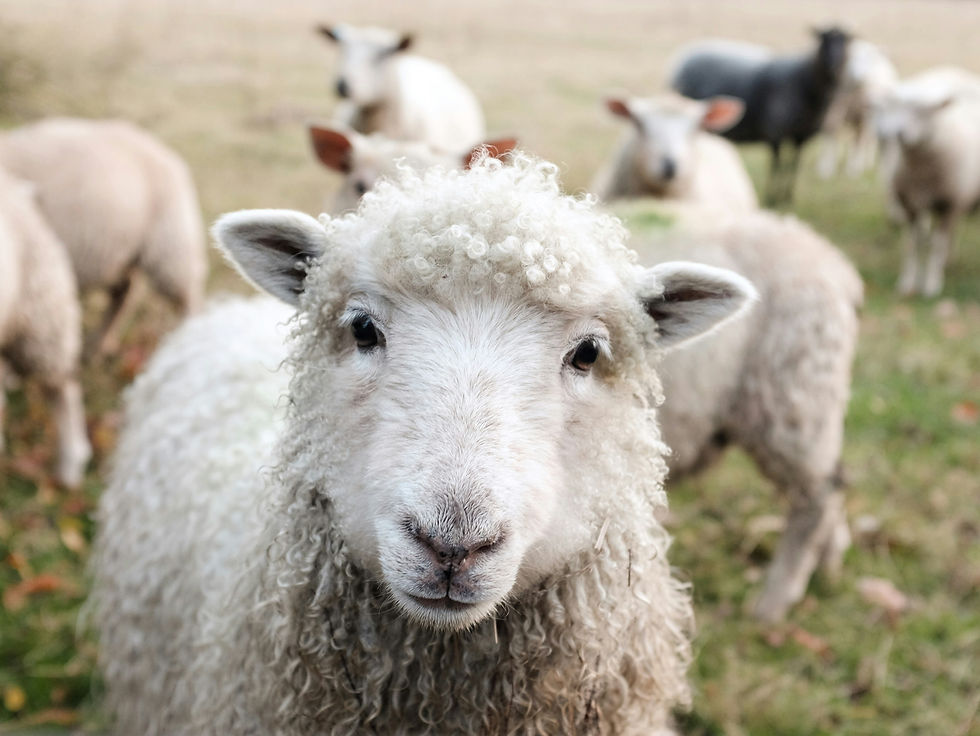Love focussed into action: Resurrection Encounters with Jesus
- Rev. Dan Gates

- Apr 29, 2024
- 5 min read
John 21:15-19

During Holy Week, you might have read the account of Peter being questioned about his relationship with Jesus. A girl asks him three times a version of 'you are one of his disciples weren't you?' Three times we're told that Peter denied any connection with Jesus. And on the third denial, predicted by Jesus beforehand, the rooster crows, signalling the betrayal. Peter is left distraught, knowing he had done something which couldn't be undone. So now, in this resurrection encounter with Jesus, we find Jesus asking for a chat with Peter. What is going through Peter's mind do you think? Is Jesus back for revenge, to give Peter a piece of his mind? Or will something else happen?
Let me invite you to imagine three different versions of what is going on in this story, three different ways of understanding the meaning of Jesus' question. You might like to imagine you are overhearing this conversation, and as you listen to Jesus ask his question of Peter you might hear him addressing you too: do you love me? However you understand this question, and we will think about three ways here, the outcome is always going to be the same: feed my sheep. Jesus insists that love for him must always be focussed into action for others.

We begin with an interpretation of this passage that is tried and tested. Jesus wants this chat with Peter not to punish him but for the opposite reason: to heal Peter of his guilt and shame. Once that final word of betrayal left his lips, Peter knew what he had done, how it had hurt Jesus, and that it couldn’t be undone. He knew he had betrayed his friend. I wonder if you know that feeling, when you’ve done something you know can’t be undone. Out of fear, out of carelessness, out of hurt feelings: whatever the reason, I’m sure we’ve all said or done something that has caused another pain and of which we are ashamed and guilty. But I wonder if we have known a friend like Jesus. A friend who comes to us and offers us grace and forgiveness. Three times Peter denied Jesus; so three times Jesus asks Peter: do you love me? With each time he responds, Peter is being set free. This is a profound display of what forgiveness looks like, and what forgiveness can do in someone’s life. Answer-by-answer, yes-by-yes, Peter is healed. But healed for more than just his own sake. What does Jesus say each time? Feed my sheep. Take what you have received from me and give it to those I love. Freely you have received, freely give. Forgiveness is a kind of healing, and once healed we are sent out to offer it to the world. ‘Do you love me?’ Jesus asks us, undoing our shame, forgiving us our guilt, he heals us to be healers in the world. Maybe this way of reading the passage is for you today? Maybe you need to meet Jesus the merciful. Listen as he invites you to be set free, and accept his command to go and do the same for others.

A second interpretation. I wonder, as Jesus asks this question, if he is inviting Peter into something a bit deeper than a simple yes or no answer. Do you love me, Peter? And before you say yes, think about it. What would it mean to say yes? You can maybe see how this draws us to a deeper place. We might immediately say ‘yes’ to Jesus’ question: of course I love you. But how do I know that I do? Do if I even know what it means to give a ‘yes’ to his question? Surely to love Jesus means more than personal devotion, coming to church, singing some songs about how awesome he is. How else would I know that I love him? Three times Peter is asked the same question, he says ‘yes’ each time, but with every asking of the same question I have to think Jesus is saying something like: don’t assume you know the answer! Allow the question to take you deeper, to challenge your assumptions, to see that perhaps there is more to learn yet. And I think a big part of finding the answer is this: feed my sheep. We learn our love for Jesus by loving his sheep. Do I take that love and put it to work helping others, caring about their wellbeing, giving my time to serve, being generous with my money?

One more interpretation. Sometimes we are handed a version of our faith, a version of Jesus, which begins with the idea that we’re basically always wrong! We’re guilty, we’re wrong in some fundamental way. But is that true? What if, when God sees you, God sees a beloved child? You have made mistakes, you have made bad choices, but in love God finds you and brings you to a place of wholeness and life. Nothing has changed about your being; you are who God made you to be, whatever anyone else has to say about that. Your actions might have brought you to places of disconnection, but you yourself are loved by God. So when Jesus comes looking for Peter, he doesn’t want to bash him over the head; no he wants Peter to know that actually within him is more than even Peter knows. Do you love me? Do you love me? Do you love me? Maybe Peter needed three times before he finally understood and believed: of course I love him! Jesus was drawing out of Peter something Peter knew deep down, a version of himself that perhaps he couldn’t see through all the guilt and shame. He needed to hear out loud, in his own voice, ‘yes, Jesus, I love you!’ He is finally meeting his true self, the one made in the image of God. And with each affirmation of what is true, Jesus invites Peter to do something with that truth: feed my sheep. Go and be with others, and discover that by serving them, loving them, you are serving and loving me. Find for yourself that every generous act, every cup of water to the thirsty, every word of forgiveness or kindness or hope, all of it speaks of a love for Jesus deeper than you could really know. I wonder if this is for you today? Do you need to be reminded of what you know is true deep in your bones, that you are a friend of Jesus, that something of him has gripped hold of you and lives in the most intimate place in your soul? Do you need to be invited to let that true self come to the surface, to be put to work loving others?

Three versions of one interaction between Jesus and Peter. Ultimately, I think our challenge today is this: to hear Jesus asking us that same question: Do you love me? And to ponder in our hearts ‘what does that question mean for me?’ And when you come up with an answer, Jesus’ response to us all will be the same: feed my sheep. Go out into the world as people sent by the Good Sheperd, love him by loving those you meet. And as our love is focussed into action, we will be joining the Risen Christ, inviting others to answer that same question: do you love me?




Comments